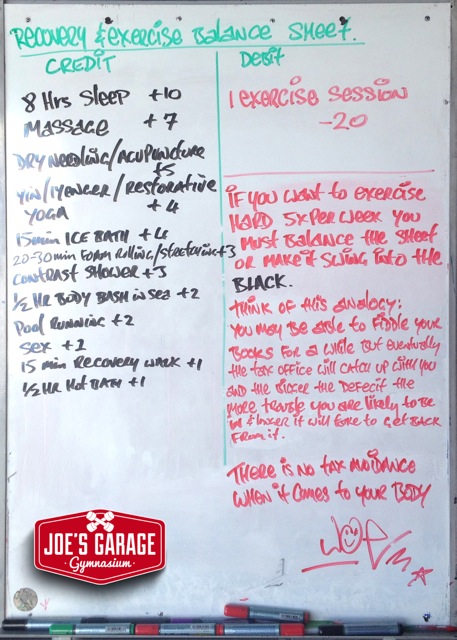
14 Oct Joe’s Recovery Balance Sheet… How to keep your body free from injury and in the black
The purpose of this article is to show you an easy way to structure your recovery, to help prevent injury, detraining, fatigue and illness. It includes a FREE DOWNLOAD of our JGG – Recovery Balance Sheet.
What are the symptoms of overtraining…. do any of the following apply to you?
Too much stress and inflammation in the system
Lots of aches and niggles
Copping a lot of injuries
Increased risk of infections
Plateauing of results
Bad sleep patterns
Feeling “flat” when training
Tiredness
Irratibility
Elevated cortisol (making it harder to burn fat)
Breakdown of muscle tissue
Decrease in libido
Decrease in appetite
You and Recovery
90% of my clients when I first talk to them, don’t get recovery. They want to train harder, longer and more. They don’t realise that they end up clocking up more hours than an elite level athlete and aren’t getting the results, infact they are preventing results and that the injuries start to follow.
Recovery is a structured part of every athletes program. By definition, if an athlete is someone who performs a physical task to get a result…. even if your training for weight loss or just to get a bit fitter you are doing the same thing, you have a result in mind. You also need to structure in your recovery to get the results you want and prevent burnout, demotivation and plateauing of results.
The Recovery Plan
A few years ago, I published an article based on a recovery program I’d learnt from a performance coach called Andrew May, which, he in turn had taken from David Misson – then coach of the Sydney Swans. David Misson had introduced a recovery system to the Swans where players accumulate 100 points each week to ensure they are recovering properly for the upcoming game.
An elite AFL player can cover more than 20km in a game, and the majority of this at high intensity. With so much energy being expended on game day, the primary focus in between games is managing injuries and getting the players ready to peak again, ready to perform at the weekend.
Each week, the players tally their recovery activities, different tasks are weighted according to their ability to facilitate recovery for the upcoming game. An ice bath or a massage would be so many points, yoga similar, an easy stretch a bit less and so on.
During the pointy end of the season, Mission would get the players to double their weekly targets and aim for 200 recovery points per week. The same year, the Swans won the Grand Final.
A few weeks ago, I saw another version of a point based recovery system on a website (I can’t remember where, otherwise i would credit them) using a credit and debit system. I thought I’d refine the system and create “Joe’s Recovery Balance Sheet” (I’ve been hanging round my accountant Brad Cowley and book keeper Dave Gorter waaaaay to much!!!)
After digging around a bit, it looks as if point based recovery systems first appeared due to the the work of Kentta and Hassmen, Train Smart: Avoid Overtraining Syndrome published 1999. Point based systems are now used by most professional sports.
“Joe’s Recovery Balance sheet” How it works?
Credits
8hrs sleep = 10 points
Massage = 7 Points
Dry needling/Acupuncture/localized deep tissue work/Chiropractic care = 5 Points
Yin, Iyenger or restorative Yoga = 4 points
15 min Ice Bath = 4 Points
20-30 min Foam Roller and stretching session = 3 points
Contrast shower = 3 points
Compression Garments (worn for minimum 3hrs after training, for travel/sleep) = 3 points
1/2hr Body bash in the sea = 2 points
10-20 mins meditation = 2 points
Pool running = 2 points
Sex = 1 point
45 min Recovery walk = 1 point
1/2hr Warm bath = 1 point
Debits
1 Hard exercise session = (minus) 20 points
So if you want to train 5 times per week, that is a debit of 100 JGG Credits
If you, in that same week get 7 nights of good quality sleep, get a massage, mediate three times, body bash in the sea twice and manage to get a bit of hanky panky in twice, come to a yoga session and do three roller sessions thats a total of 103 points. Whahey your in credit!
….but if you sleep poorly for 5 nights of the week miss your rolling sessions because your always running late or don’t do separate rolling and don’t really believe you have time for the rest of it…. you can see how quickly you are getting into deficit and into an overtrained and stressed state.
Think of your body as being a set of books, and injury and fatigue being the tax man. Now, you may be able to fiddle your books for a while, but your not being honest. Eventually, you will get caught out and audited and when you do, generally speaking the more you are in deficit or the longer you have been in deficit, the bigger fine your going to get hit with and the longer it is going to take you to recover….. There is NO tax avoidance when it comes to your body!!!
I know this first hand, the inspiration for this article was taken from my own circumstances. This last year I have worked massive weeks, particularly in the last couple of months…. and I’ve copped a whole series of injuries after training hard and NOT giving myself the recovery practices I know that I need…. and I should know better!!… Just because we are trainers, doesn’t mean that occasionally we don’t suffer from the same psychobabble that gets most of us into trouble…. and if we take our eye off the ball we end up with the same results as everybody else.
Task:
Okay a bit of homework for us all. Download our interactive JGG – Recovery Balance Sheet. It’s really easy to use and shows you clearly if you are in deficit or credit.
Use the sheet to track your progress over a month and lets see how we are tracking.
Let me know how you go.
Cheers Joe



No Comments